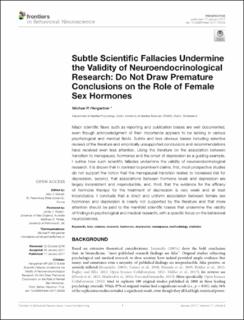Bitte benutzen Sie diese Kennung, um auf die Ressource zu verweisen:
https://doi.org/10.21256/zhaw-1582| Publikationstyp: | Beitrag in wissenschaftlicher Zeitschrift |
| Art der Begutachtung: | Peer review (Publikation) |
| Titel: | Subtle scientific fallacies undermine the validity of neuroendocrinological research : do not draw premature conclusions on the role of female sex hormones |
| Autor/-in: | Hengartner, Michael Pascal |
| DOI: | 10.21256/zhaw-1582 10.3389/fnbeh.2017.00003 |
| Erschienen in: | Frontiers in Behavioral Neuroscience |
| Band(Heft): | 11 |
| Heft: | 3 |
| Erscheinungsdatum: | 2017 |
| Verlag / Hrsg. Institution: | Frontiers Research Foundation |
| ISSN: | 1662-5153 |
| Sprache: | Englisch |
| Fachgebiet (DDC): | 610: Medizin und Gesundheit |
| Zusammenfassung: | Major scientific flaws such as reporting and publication biases are well documented, even though acknowledgment of their importance appears to be lacking in various psychological and medical fields. Subtle and less obvious biases including selective reviews of the literature and empirically unsupported conclusions and recommendations have received even less attention. Using the literature on the association between transition to menopause, hormones and the onset of depression as a guiding example, I outline how such scientific fallacies undermine the validity of neuroendocrinological research. It is shown that in contrast to prominent claims, first, most prospective studies do not support the notion that the menopausal transition relates to increased risk for depression, second, that associations between hormone levels and depression are largely inconsistent and irreproducible, and, third, that the evidence for the efficacy of hormone therapy for the treatment of depression is very weak and at best inconclusive. I conclude that a direct and uniform association between female sex hormones and depression is clearly not supported by the literature and that more attention should be paid to the manifold scientific biases that undermine the validity of findings in psychological and medical research, with a specific focus on the behavioral neurosciences. |
| URI: | https://digitalcollection.zhaw.ch/handle/11475/2253 |
| Volltext Version: | Publizierte Version |
| Lizenz (gemäss Verlagsvertrag): | CC BY 4.0: Namensnennung 4.0 International |
| Departement: | Angewandte Psychologie |
| Organisationseinheit: | Psychologisches Institut (PI) |
| Enthalten in den Sammlungen: | Publikationen Angewandte Psychologie |
Dateien zu dieser Ressource:
| Datei | Beschreibung | Größe | Format | |
|---|---|---|---|---|
| 2017_Hengartner_Subtle scientific fallacies_Frontiers in Behavioral Neuroscience.pdf | 721.03 kB | Adobe PDF |  Öffnen/Anzeigen |
Zur Langanzeige
Hengartner, M. P. (2017). Subtle scientific fallacies undermine the validity of neuroendocrinological research : do not draw premature conclusions on the role of female sex hormones. Frontiers in Behavioral Neuroscience, 11(3). https://doi.org/10.21256/zhaw-1582
Hengartner, M.P. (2017) ‘Subtle scientific fallacies undermine the validity of neuroendocrinological research : do not draw premature conclusions on the role of female sex hormones’, Frontiers in Behavioral Neuroscience, 11(3). Available at: https://doi.org/10.21256/zhaw-1582.
M. P. Hengartner, “Subtle scientific fallacies undermine the validity of neuroendocrinological research : do not draw premature conclusions on the role of female sex hormones,” Frontiers in Behavioral Neuroscience, vol. 11, no. 3, 2017, doi: 10.21256/zhaw-1582.
HENGARTNER, Michael Pascal, 2017. Subtle scientific fallacies undermine the validity of neuroendocrinological research : do not draw premature conclusions on the role of female sex hormones. Frontiers in Behavioral Neuroscience. 2017. Bd. 11, Nr. 3. DOI 10.21256/zhaw-1582
Hengartner, Michael Pascal. 2017. “Subtle Scientific Fallacies Undermine the Validity of Neuroendocrinological Research : Do Not Draw Premature Conclusions on the Role of Female Sex Hormones.” Frontiers in Behavioral Neuroscience 11 (3). https://doi.org/10.21256/zhaw-1582.
Hengartner, Michael Pascal. “Subtle Scientific Fallacies Undermine the Validity of Neuroendocrinological Research : Do Not Draw Premature Conclusions on the Role of Female Sex Hormones.” Frontiers in Behavioral Neuroscience, vol. 11, no. 3, 2017, https://doi.org/10.21256/zhaw-1582.
Alle Ressourcen in diesem Repository sind urheberrechtlich geschützt, soweit nicht anderweitig angezeigt.